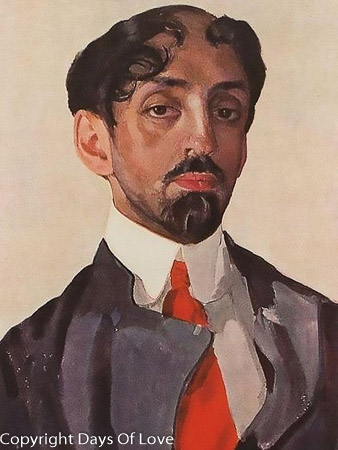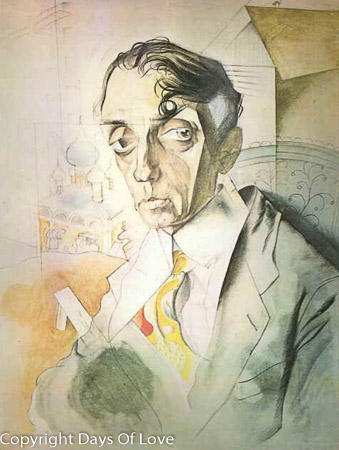

Partner Yury Yurkun
Queer Places:
Stray Dog, Ital'yanskaya Ulitsa, 4, Sankt-Peterburg, Russia, 191186
Saint Petersburg Conservatory, Theatre Square, 3, Sankt-Peterburg, Russia, 190000
Literatorskie Mostki
Saint Petersburg, Saint Petersburg Federal City, Russia
 Mikhail Alekseevich Kuzmin (October
18 [O.S.
October 6] 1872 – March 1, 1936) was a Russian poet, musician and novelist, a
prominent contributor to the
Silver Age of Russian Poetry. Mikhail Kuzmin came to be regarded as ‘the
Russian Oscar Wilde’ after the publication of his novel Wings in 1906; and, a
touch more absurdly, ‘the Russian Noël Coward’. Modernism. In a diary entry (6
June 1906), Kuzmin called Wilde ‘that snob, that hypocrite, that bad writer
and faint-hearted man, who besmirched that for which he was put on trial’.
Mikhail Alekseevich Kuzmin (October
18 [O.S.
October 6] 1872 – March 1, 1936) was a Russian poet, musician and novelist, a
prominent contributor to the
Silver Age of Russian Poetry. Mikhail Kuzmin came to be regarded as ‘the
Russian Oscar Wilde’ after the publication of his novel Wings in 1906; and, a
touch more absurdly, ‘the Russian Noël Coward’. Modernism. In a diary entry (6
June 1906), Kuzmin called Wilde ‘that snob, that hypocrite, that bad writer
and faint-hearted man, who besmirched that for which he was put on trial’.
Born into a noble family in Yaroslavl, Kuzmin grew up in St. Petersburg and studied music at the Saint Petersburg Conservatory under Nikolai Rimsky-Korsakov. He did not graduate, however, later explaining his move towards poetry thus: "It's easier and simpler. Poetry falls ready-made from the sky, like manna into the mouths of the Israelites in the desert."[1] But he did not give up music; he composed the music for Meyerhold's famous 1906 production of Alexander Blok's play Balaganchik (The Fair Show Booth), and his songs were popular among the Petersburg elite: "He sang them, accompanying himself on the piano, first in various salons, including Ivanov's Tower, and then at The Stray Dog. Kuzmin liked to say of his work that 'it's only little music, but it has its poison.'"[2]
One of his closest friends and major influences as a young man was the polyglot Germanophile aristocrat Georgy Chicherin (who later entered the diplomatic service and after the October Revolution became People's Commissar of Foreign Affairs), a passionate supporter of Wagner and Nietzsche. Another strong influence was his travels, first to Egypt and Italy and then to northern Russia, where he was deeply impressed by the Old Believers. Settling down in St. Petersburg, he became close to the circle around Mir iskusstva (World of Art). His first published writings appeared in 1905 and attracted the attention of Valery Bryusov, who invited him to contribute to his influential literary magazine Vesy (The Balance), the center of the Symbolist movement, where in 1906 he published his verse cycle "Alexandrian Songs" (modeled on Les Chansons de Bilitis, by Pierre Louÿs[3]) and the first Russian novel with a homosexual theme, Wings, which instantly achieved notoriety and made him a widely popular writer. In 1908 appeared his first collection of poetry, Seti (Nets), which was also widely acclaimed. In the words of Roberta Reeder, "His poetry is erudite and the themes range from Ancient Greece and Alexandria to modern-day Petersburg."[4]

Kuzmin himself had travelled with his lover ‘Prince Georges’, a cavalry officer, to Constantinople, Athens, Smyrna, Alexandria, Cairo and Memphis. In 1897 he took a trip to Rome and, having fallen in love with the lift boy, took him to Florence, intending eventually to take him all the way home to Russia ‘in the capacity of my servant’. In the event, though, he sent the boy home to Rome instead.
Sergei Diaghilev thought very highly of Mikhail Kuzmin’s work. They saw so much of each other for a short time in 1907 that Kuzmin noted in his diary: ‘Gossip is making the rounds about me and Diaghilev. Quel farce’ (31 October 1907).
In 1908 he was living with Sergei Sudeikin and his first wife Olga Glebova, whom he had married just the year before; when Olga discovered her husband was having an affair with Kuzmin, she insisted Kuzmin move out. "But in spite of this contretemps, Kuzmin, Sudeikin, and Glebova continued to maintain a productive, professional relationship, collaborating on many ventures—plays, musical evenings, poetry declamations—especially at the St. Petersburg cabarets."[5] Kuzmin was also one of the favorite poets of Sudeikin's second wife, Vera, and her published album contains several of his manuscript poems.
Kuzmin's association with the Symbolists was never definitive, and in 1910 he helped give rise to the Acmeist movement with his essay "O prekrasnoi yasnosti" (On beautiful clarity), in which he attacked "incomprehensible, dark cosmic trappings" and urged writers to be "logical in the conception, the construction of the work, the syntax... love the word, like Flaubert, be economical in means and niggardly in words, precise and genuine -- and you will find the secret of an amazing thing — beautiful clarity — which I would call clarism."[7] He was no more a member of the group than he had been of the Symbolists, but he was personally associated with a number of them; in the years 1910-12 he lived in the famous apartment (called the Tower) of Vyacheslav Ivanov, who was another formative influence on the Acmeists, and he was a friend of Anna Akhmatova, for whose first book of poetry, Vecher [Evening], he wrote a flattering preface. (In later years Kuzmin incurred Akhmatova's enmity, probably because of a 1923 review she took as condescending, and she made him a prototype of one of the villains in her "Poem Without a Hero".[8])
Kuzmin met Yury Yurkun, a poet in 1913. The two men lived together with Yurkun's mother, and Yurkun’s wife, Olga Arbenina, joined them, for a short while. Kuzmin and Yurkun's relationship lasted until Kuzmin's death. Kuzmin died in 1936 of pneumonia, two years before Yurkun and many other writers were arrested under the Stalinist regime and shot.[6]
Mikhail Kuzmin was greatly admired by such younger poets as Sergei Esenin and Marina Tsvetaeva, both of whom met him at the same St Petersburg literary soirée in January 1916.
The last volume of poetry Kuzmin published during his lifetime was The Trout Breaks the Ice (1929), a cycle of narrative poetry.[9]
In the 1920s and 1930s Kuzmin made his living primarily as a literary translator, most notably of Shakespeare's plays.[10]
Sergei Diaghilev told Mikhail Kuzmin about a student in Moscow called Vladimir Ruslov, ‘a proselytizer and casse-tête, who considers himself Dorian Gray, who always has about thirty comrades at the ready par amour’. Kuzmin corresponded with Ruslov, in the words of his biographers, ‘fascinated as he was by the aura of legend that surrounded him and by the idea that a new kind of “gay society” of unprecedented sexual openness might be formed with Ruslov and his young friends as the Moscow nucleus’. Years later, on 1 March 1924, Ruslov wrote to tell Kuzmin about a ‘small, very intimate circle made up in the main of young poets’ that was meeting in Moscow under the name ‘Antinous’, its aim being ‘the revelation of male beauty in print’. They asked Kuzmin to give them a reading, and after various difficulties, on 11 May he did so.
He died in Leningrad.
My published books: